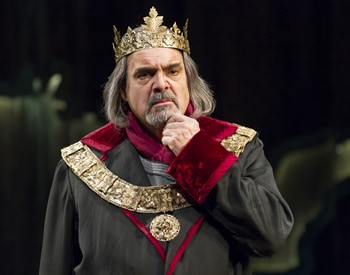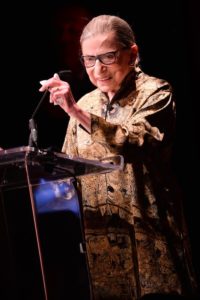The verdict is in: Shylock–the Jewish moneylender whose trial is detailed in Shakespeare’s The Merchant of Venice–has been exonerated.
Supreme Court Justice Ruth Bader Ginsburg presided over the appeal, which was held at the Library of Congress and timed to coincide with its exhibition marking the 500th anniversary of the Ghetto.
Shylock himself was portrayed by Edward Gero, one of the brightest stars of the DC stage and four-time Helen Hayes Award winner. (Gero, in one of those history-making coincidences, can be seen in a different courtroom when he returns to his role of Justice Antonin Scalia in The Originalist at Arena.)

“Suffering is the badge of all our tribe,” Gero said, as he stood, brows furrowed, before the judges and delivered three of Shylock’s best-known tirades.
“I am a Jew…I stand for justice…(and) I shall have it,” he concluded, ceding the stage to the lawyer appointed to defend him against the charge of demanding a pound of flesh in repayment of a loan gone sour.
The pound of flesh was considered, by the original judge, to be equal to attempted murder.
However, the judge in the original case was Portia, the wife of one of the borrowers, who was impersonating a judge and thus was guilty of deceit. She, too, was up for exoneration.
Portia’s lawyer, Teresa Miguel-Stearns, came up with the most interesting defense of the trial, which was that her client be discharged on grounds of gender discrimination.
“My client had very limited opportunities to pursue a career,” Ms. Miguel-Stearns said. “Pretending to be a judge was her way to advance her career as a lawyer.”
Counsel also pointed out that Portia, by impersonating the judge, saved the lives of both men by preventing Shylock from extracting his ‘pound of flesh’ and for his subsequent execution for it.
Justice Ginsburg agreed that Portia was learned in the law. “She had to be, to be such a trickster.”
Amply demonstrating her knowledge of both the law and Shakespeare, Ginsburg raised a number of pointed questions.
Of Shylock’s forced conversion to Christianity, she asked: “Is this an act of vengeance or a merry sport?”
“There are many truths in the record,” she said ruefully, at one point, to which one of the other judges, Dean of the Wake Forest School of Law Suzanne Reynolds, replied, “The record, while beautifully written, is thin.”

The idea for the trial came from Dick Schneider, associate dean at Wake Forest, who organized a similar event in Venice last summer to mark the founding of the Venetian Ghetto in 1516.
Others on the program included David Dangoor, president of the American Sephardi Federation, who confirmed that Shylock–like most Italian Jews today–was Sephardic.
Michael Kahn, Artistic Director of the Shakespeare Theatre Company for nearly three decades, elaborated on the plot of the play for the benefit of those who had not seen it in a while.
While the judges were deciding the case, the audience, having been held hostage in the auditorium for two hours without intermission, was prevented from leaving by James Shapiro. The author of Shakespeare and the Jews entertained the crowd with bits of Shylock lore.
For example, Shapiro explained that it was not true that there were no Jews in England in Shakespeare’s day. In fact, there were about 150 of them, but Shakespeare apparently didn’t know them.
The speaker also explored hints of homosexuality in the play, suggesting a non-business relationship between Antonio and Bassanio. (There was also the possibility of a threesome involving Portia.)
Shakespeare’s many lawsuits were explored, but that discussion was cut short by the return of the judges with their verdict.
Speaking for the majority, Justice Ginsburg decreed that Shylock would get his money back, but without interest, and that the conversion would be cancelled. Portia, on the other hand, would be considered an excellent candidate for law school.
Running Time: Two hours and 30 minutes with no intermission.
Justice for Shylock played one performance on June 21, 2017, at the Library of Congress – 101 Independence Ave, SE, in Washington, DC. For information about future events, check online.




